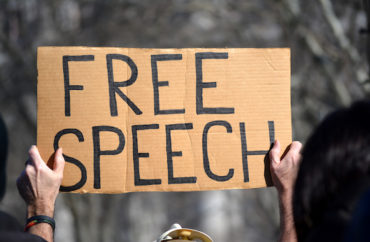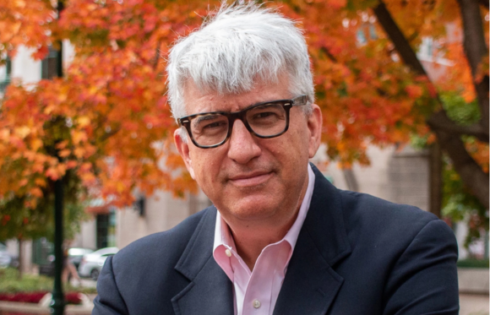
University updated free speech policy to combat antisemitism
Watchdogs and students at Texas State University have voiced concerns that freedom of expression may be restricted this fall on campus under the recently updated free speech policy, but others say the move protects Jewish and pro-Israel students from illegal harassment.
Texas State University updated its Expressive Activities Policy on June 20 to comply with Gov. Greg Abbott’s March 27 Executive Order requiring increased protections against antisemitism on colleges in the wake of aggressive and sometimes violent anti-Israel protests seen on campuses nationwide.
The order instructed public universities in Texas to review their free speech policies and punishments for antisemitism on campus and utilize the Texas Code’s working definition of antisemitism for such measures.
Texas State’s policy defines antisemitism as “a certain perception of Jews that may be expressed as hatred toward Jews. The term includes rhetorical and physical acts of antisemitism directed toward Jewish or non-Jewish individuals or their property or toward Jewish community institutions and religious facilities.”
Some argue the policy now forbids legitimate verbal criticisms of Israel.
“Governor Abbott’s executive order requires colleges to adopt a definition of antisemitism that includes protected speech, including core political expression, such as mere criticism of Israel,” Laura Beltz told The College Fix via email.
Beltz is director of policy reform for the Foundation for Individual Rights and Expression.
The Young Democratic Socialists of America at Texas State, which participated in anti-Israel protests this spring, has publicly criticized Abbott’s order.
The progressive student group told The Fix in an emailed statement that they hope the new policy will “narrowly focus on protecting Jewish students without cracking down on spaces for pro-Palestinian students to organize at Texas State.”
“However, we are still wary.”
“EO GA 44 immediately came up on our radar for the way it explicitly synonymizes anti-zionism with anti-semitism and calls for the discipline of pro-Palestine students, staff, and faculty in Texas higher education,” said the student group.
What’s more, Texas State U. did not notify students of the policy change, sparking criticism this summer.
Asked about the concerns, Jayme Blaschke, a university spokesperson told The College Fix: “Texas State remains committed to upholding the First Amendment and respects individuals’ rights to express their views through all forms of legally protected speech. The university is following and in compliance with the Governor’s Executive Order, GA-44.”
Texas State was among many universities where students orchestrated anti-Israel protests during the spring. Unlike other schools, such as the nearby University of Texas at Austin, the anti-Israel protest at Texas State was non-violent, and no arrests were made. Campus police were present but did not have to take action.
Thomas Lindsay, policy director of higher education and distinguished senior fellow at the Texas Public Policy Foundation, said the criticisms of Abbott’s order miss the mark.
“I would just simply remind those who are concerned about free speech rights that the right of free speech also carries with it the responsibility not to abuse it—not to use it to incite violent action,” he told The College Fix in a recent phone interview.
“I mean, you heard the pro-Hamas protestors, ‘From the river to the sea,’ right? You know what that means? What that means is Israel will be exterminated … that is their open purpose. They’re not bashful about it. There is no protection under the First Amendment for that type of speech, never has been,” he said.
“Think about for a second here: If someone were to try to say, ‘Well, I’m on a public university campus, so I have a right to go around and harass black students and call them the n-word.’ No, that’s nuts, right? The liberty of speech also comes with responsibility,” he said.
“In other words, yes, you have a right to free speech and to protest, but not when kids are trying to take their classes right outside where you’re doing it, and not in a manner that disrupts students when they’re trying to get to and from class. … Those restrictions all have been in place and are in place,” he said.
“I think that the Executive Order from the governor was exactly the right thing to do. Texas State’s updated policy, in light of the Governor’s Executive Order, prohibits speech that incites violent action. It doesn’t change the needed restrictions on free speech that already exist,” he said.
FIRE’s Beltz said the definition of antisemitism required by the order tracks the International Holocaust Remembrance Alliance’s definition.
“The lead author of that definition has cautioned against its codification into law, even warning of the potential chilling effect it would have on campus speech. It’s vague, which means students will be left guessing at what sort of speech could land them in trouble,” she said.
“Students in that position are likely to self censor in order to avoid punishment. And it’s overbroad, which means its broad definition includes speech and conduct that isn’t protected by the First Amendment, but it also includes speech that is protected, like criticizing the Israeli government,” she said.
“Texas State University’s policy adopts the required definition of antisemitism, which will leave students wondering whether they’ll be punished over speech that could conceivably meet that definition,” she added.
Mike Wintemute, Texas State University System’s vice chancellor for marketing and communications, told WUT News that potential consequences for violating the policy are unclear.
“Disciplinary action is based really on a variety of factors, and I don’t want to prejudice the outcome of any future disciplinary process,” Wintemute said. “It really will be determined on a case-by-case basis.”
MORE: 10 of the most extreme acts of campus antisemitism in the 2023-24 school year
IMAGE: Shutterstock





Please join the conversation about our stories on Facebook, Twitter, Instagram, Reddit, MeWe, Rumble, Gab, Minds and Gettr.